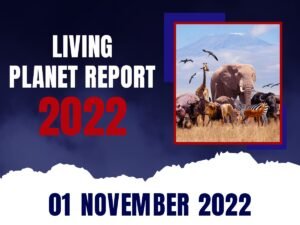Context –
According to the World Wide Fund (WWF) for Nature’s biennial Living Planet Report 2022, animal populations of mammals, birds, amphibians, reptiles, and fish have declined by 69% globally in the previous 50 years.
What are the Report’s Key Findings?
Wildlife Population Decline by Region:
- The region of Latin America and the Caribbean had the greatest drop in animal populations (94%).
- Africa had a 66% reduction in animal populations between 1970 and 2018, while Asia-Pacific saw a 55% decline.
Freshwater Species Population Decline:
- Freshwater Species populations have decreased by 83% worldwide.
- About half of the hazards to monitored migratory fish species were caused by habitat loss and impediments to migration pathways.
Collapsing Vertebrate Wildlife Populations:
- According to the Living Planet Index (LPI), vertebrate wildlife populations are collapsing at an especially alarming rate in tropical parts of the planet.
- LPI is a measure of the condition of the world’s biological diversity based on population trends of vertebrate species from terrestrial, freshwater, and marine ecosystems, with about 32,000 populations of 5,230 species worldwide.
Mangrove Degradation:
- At a rate of 0.13% per year, mangroves are being lost to aquaculture, agriculture, and coastal development.
- Overexploitation and pollution, as well as natural stresses like storms and coastal erosion, have all contributed to the degradation of many mangroves.
- Since 1985, approximately 137 square kilometres of the Sundarbans mangrove forest in India and Bangladesh have degraded, diminishing land and ecosystem services for many of the ten million people who live there.
Key Biodiversity Threats:
WWF identified six major challenges to biodiversity in order to identify “threat hotspots” for terrestrial vertebrates:
- Agriculture
- Hunting
- Logging
- Pollution
- Species that are invasive
- Changes in the climate
The World Wildlife Fund for Nature –
- It is the world’s leading conservation organization, with operations in over 100 countries.
- It was founded in 1961 and is based in Gland, Switzerland.
- Its purpose is to protect the environment and alleviate the most severe threats to Earth’s biodiversity.
- WWF works with people all around the globe to create and execute creative solutions that safeguard communities, animals, and the environments in which they live.
What are the Report’s Recommendations?
- The Planet is facing two crises: human-caused climate change and biodiversity loss, both of which endanger the well-being of current and future generations. Because biodiversity loss and climate change are interconnected, they should be addressed as one concern rather than two.
- Transformative, game-changing reforms in how we create, consume, govern, and finance are required for a nature-positive future.
- A more inclusive collaborative approach to a more sustainable route is required. It will guarantee that the costs and rewards of our activities are shared in a fair and equitable manner.

